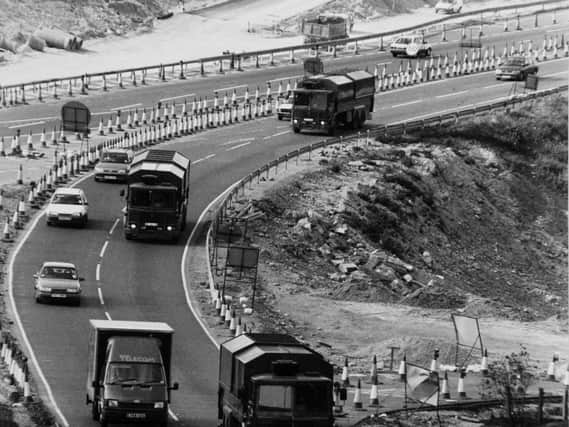Readers' letters - May 25


It was terrifying to learn, on Monday (May 21), that yet another nuclear weapons convoy was being driven down the M6, very close to my home and the homes of thousands of others in Cumbria and Lancashire.
The convoy was very likely to be carrying nuclear warheads from the Royal Naval Armaments Depot at Coulport near Glasgow to the nuclear weapons factory at Burghfield in Berkshire.
Advertisement
Hide AdAdvertisement
Hide AdWhat was the more terrifying was that this news coincided with last week’s admission by Defence Procurement Minister Guto Bebb that the number of convoy incidents logged by officials in 2017 was the highest since 2008.
Indeed, these 44 incidents brought the total number of incidents recorded in the last ten years to a staggering 179.
On this occasion, the MoD gave no details of the incidents, but, in the past, the incidents recorded have included collisions, breakdowns and equipment failures. Brakes have failed, fuel has leaked and engines have overheated. Convoys have also got lost and been delayed or diverted by bad weather and accidents.
All this would be worrying enough for any convoy comprising up to 20 or more military vehicles, but these convoys are transporting Trident nuclear warheads across the country, meaning that the potential for calamity is extremely high.
Advertisement
Hide AdAdvertisement
Hide AdIf such an incident occurred close to a heavily populated area, it would be extremely difficult to effectively evacuate the vicinity before potentially lethal material spread.
However, there is no MoD guidance in the public domain dealing with such an issue or telling us whether and how traffic would be quarantined or locked in a contaminated zone. It is surely time to stop these convoys before it is too late.
Philip Gilligan
Milnthorpe
energy
Contrary to local wishes
A Commons Select Committee is part way through an inquiry into planning guidance on fracking – is it adequate and should the decisions be made at national or local level?
On May 14, the committee took evidence from four Mineral Planning Authorities (MPAs), including LCC and North Yorkshire. Both are authorities which had to decide on shale gas applications.
Advertisement
Hide AdAdvertisement
Hide AdThey agreed it should be a local decision and that there was no need for a new overall regulator. LCC noted: “It is important that we consider, and that the planning authority is satisfied with, things like groundwater impact, even though that is controlled by the Environment Agency, and seismicity. It is important we consider that and are satisfied about that.”
The following day, a written statement (WMS) was issued jointly by the Departments of Energy and Local Government, which effectively sidelined the inquiry, announcing changes designed to smooth the way for shale gas through the planning system. It repeated the government’s view that shale gas development was of national importance, and emphasised that county councils must make timely decisions.
It seems that MPAs should approve shale gas applications and quickly, otherwise the decision will be taken out of their hands.
The WMS has outlined proposals to allow shale gas exploration to be Permitted Development; stated that a new single overall regulator would be set up; that planners can rely on the advice of regulatory experts, and that they should not set restrictions which would limit shale development without proper justification.
Advertisement
Hide AdAdvertisement
Hide AdIt should be noted that Permitted Development are rules designed to allow a conservatory to be built. To include shale exploration rights in this would allow a vast wellpad like Cuadrilla’s at Preston New Road to be built and for wells to be drilled, including horizontals, without it going through the planning process.
This is contrary to the wishes of the MPAs involved.
It seems that members of the cabinet are extremely frustrated to find they live in a democracy, not only are they trying to impose their views on councils and residents, they have also thwarted a Select Committee which is set up to scrutinise government.
T Froud
Lytham
brexit
Survey on EU
YouGov has been carrying out a poll to see how voters from across the “Leave – Remain” divide feel that the Brexit project is progressing.
The results are split between the first group who expected (June 2016) Brexit to go well and the second group that expected (June 2016) things to go badly.
The options were:
Advertisement
Hide AdAdvertisement
Hide AdI expected Brexit to go well and I think it is going well so far – nine per cent.
I expected Brexit to go well but I don’t think it is going well so far – 28 per cent.
I expected Brexit to go badly but I think it is going well so far – five per cent.
I expected Brexit to go badly and I think it is going badly so far – 39 per cent.
Don’t know – 19 per cent
Advertisement
Hide AdAdvertisement
Hide AdFrom the above, we can see that (leaving out the 19 per cent “don’t knows”) just 14 per cent of those surveyed think that Brexit is going well while 67 per cent think that Brexit is either “not going well” or “going badly”.
From this survey, Brexit is falling well short of expectations.
Note that even among those who expected Brexit to go well, the disappointed outnumber the satisfied by three to one.
John Cole
Address supplied